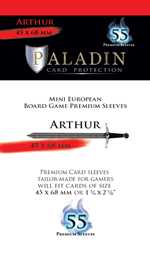
55 x Paladin Card Sleeves: Arthur (45mm x 68mm)
Paladin Card Sleeves suitable for cards measuring 45 x 68mm.
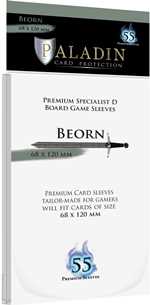
55 x Paladin Card Sleeves: Beorn (68mm x 120mm)
Premium Quality, exceptionally durable. Highest Level of Clarity, 90 Microns thick, 55 Sleeves per pack measuring 68 x 120 mm or 2 5/8 x 4 3/4 inches.
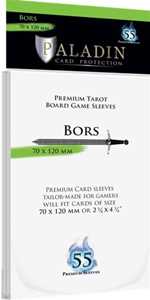
55 x Paladin Card Sleeves: Bors (70mm x 120mm)
Paladin Card Sleeves suitable for 'Tarot' cards measuring 70 x 120mm.

55 x Paladin Card Sleeves: Gaheris (80mm x 120mm)
Premium Quality, exceptionally durable. Highest Level of Clarity, 90 Microns thick, 55 Sleeves per pack measuring 80 x 120 mm or 3 1/4 x 4 3/4 inches.
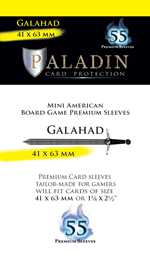
55 x Paladin Card Sleeves: Galahad (41mm x 63mm)
Paladin Card Sleeves suitable for cards measuring 41 x 63mm.
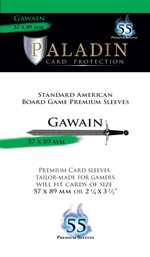
55 x Paladin Card Sleeves: Gawain (57mm x 89mm) (On Order)
Paladin Card Sleeves suitable for cards measuring 57 x 89mm.

55 x Paladin Card Sleeves: Hazel (44mm x 63.5mm)
Paladin Card Sleeves suitable for cards measuring 44 x 63.5mm.
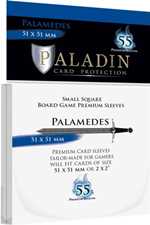
55 x Paladin Card Sleeves: Palamedes (51mm x 51mm)
Paladin Card Sleeves suitable for cards measuring 51 x 51mm.

55 x Paladin Card Sleeves: Percival (63.5mm x 89mm) (On Order)
Paladin Card Sleeves suitable for 'Standard' and 'CCG' cards measuring 63.5 x 89mm.

55 x Paladin Card Sleeves: Trevor (76mm x 76mm)
Paladin Card Sleeves suitable for cards measuring 76 x 76mm.
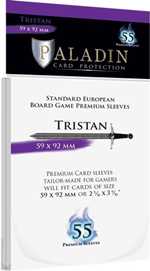
55 x Paladin Card Sleeves: Tristan (59mm x 92mm)
Paladin Card Sleeves suitable for 'Standard European' cards measuring 59 x 92mm.

Barcelona Board Game
It's the mid-19th century. The city of Barcelona is the most densely populated city in all of Europe. Shortly after the old city walls were finally destroyed, Ildefons CerdÖ, who is now considered the inventor of urbanism, presented the plan for the creation of the 'Eixample', the expansion that Barcelona so desperately needed. Its construction began in 1860.
In Barcelona, you will take on the role of builders in 19th-century Barcelona working on the new expansion to the city. Your main goal is to construct buildings to accommodate the citizens who want to leave the old city, and in the process, you will also build streets, create tram lines, and build public services. You may even decide to explore. Modernisme, a new architectural and arts style that has been gaining popularity among the rich.
Barcelona is a city building game that is played over a variable number of rounds interrupted by three scoring phases before a final scoring phase. Every round, each player takes a single turn consisting of two or more actions, a building phase, when we add new buildings to the main board, and then preparation for their next turn. There are multiple opportunities to score victory points during the game, but players also gain points at the end of the game from unlocked spaces on their player boards and from Modernisme projects tiles that they acquired. The player with the most points wins.

Barcelona Board Game: Passeig De Gracia Expansion
Of all the streets of the Eixample, Passeig de Gracia is the most iconic. First, it was just a road connecting Barcelona and the former town of Gracia, now a major district of Barcelona. It became a promenade where Barcelona's citizens went to relax, and was filled with restaurants, coffee shops, ballrooms, theaters, parks, and even rollercoasters. Unfortunately, these amenities were only available to the upper and middle classes, as they were often part of private gardens.
When construction of the Eixample started, all of these features were removed to make room for buildings, but it did not diminish Passeig de Gracia importance. Many rich citizens decided to build their houses there, hiring the most famous modernist architects, who created some of the most iconic landmarks of the city. Barcelona: Passeig de Gracia is an expansion for Barcelona and thus you need a copy of the base game to play it. The new elements brought by this expansion are Pedestrians who walk along the Passeig de Gracia enjoying various amenities there. The more pleasant their walk, the bigger the rewards you gain once they reach their destination.
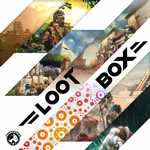
Board And Dice: LootBox #1
This dedicated box for fans of Board and Dice's games comes with additional content not previously available for several of their titles including Origins: The First Builders, Tawantinsuyu: The Inca Empire, Teotihuacan: City of the Gods and many more!
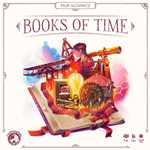
Books Of Time Card Game
The history of humankind has been written down for thousands of years. Our technological achievements, geographical discoveries, and the will to prosper are woven into intricate threads spread throughout books that tell the story of our time on Earth. Now you have the chance to shape this story.
Books of Time puts a unique and exciting twist on tableau building, allowing you to construct three great books, each with their own sets of special abilities that you can write, thereby creating incredible combinations. The story of a civilization is now truly at your fingertips.
Three types of pages go into player books: trade, science, and industry. During the game, you add pages to these books to create powerful combinations of actions that you can activate. You need to efficiently manage your resources to create the books that will meet your personal objectives and score you the most points.
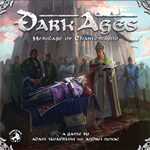
Dark Ages Board Game: Heritage Of Charlemagne
Dark Ages is a historically-based civilization-building game that features an innovative action selection mechanism. As long as your action markers remain on the board, you may be able to gain secondary bonus actions whenever you or another player repeat the action.
While Dark Ages features objectives commonly found in 4X games - encouraging you to explore nearby regions, expand your territory, exploit the resources, and exterminate your opponents - it does so featuring several Euro-centric mechanisms. Collect resources from lands under your control, using them to build up your cities and fortifications. Some building types provide several ways for you to gain important in-game advantages, while others enhance your military strength or simply score you victory points. As you expand your territory, you will lay claim to noble titles, acquire new technologies, and train your military units. Each region and leader offer asymmetrical choices with their unique abilities.
Dark Ages is actually two games: Western Europe (subtitled Heritage of Charlemagne) and Central Europe (subtitled Holy Roman Empire). While both versions feature identical gameplay, each focuses its attention on a specific part of Europe during the Dark Ages (Western and Central, respectively). As a result, the game board maps differ between the two versions, as do the lands in which players vie for control over along with the flavor of the inhabitants and leaders of those lands. However, by combining both versions, you can enlarge the map into an epic battle for superiority for five or more players!
Each game box is filled with finely sculpted miniatures of cities, fortresses, farms, and other buildings. The different types of troops - infantry, bowmen, and cavalry - are represented by unique miniatures.
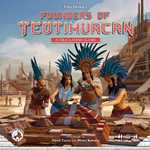
Founders Of Teotihuacan Board Game
Founders of Teotihuacan is a strategy game where you compete against your friends to create the best design of the city of Teotihuacan. Over the course of three to four rounds you will place your action disks to the main board, forming towers of varying strength, strategically use the bonuses they offer, and construct temples, resource buildings and the pyramid central to your project of Teotihuacan. You will balance generating resources and using them, as finding good locations on your city board becomes increasingly more difficult, and you will try to outwit your opponents, making use of an innovative and interactive action system. Finally, once the eclipse comes, all designs will be assessed and the player with the most points will win and become the architect to join the ranks of Founders of Teotihuacan!
Founders of Teotihuacan is a stand-alone game, related to Teotihuacan: City of Gods only by the shared setting of the ancient city of Teotihuacan. Thematically, the events in Founders takes place at an earlier time in history, while what was to become a magnificent city was yet in its infancy and only few inhabited the area.
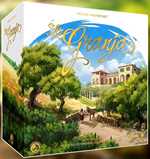
La Granja Deluxe Master Set Board Game: La Granda Expansion
The La Granda Box for La Granja is filled with colossal components. Boards, building and player markers, dice, and more! Play your games of La Granja in a truly Epic Scale!

Mandala Stones Board Game
Welcome to Mandala Stones, a game of tranquility and beauty! Arrange colorful stones to create a stunning work of art together with your friends. However, while there are many creators, there can be only one winner. Influence artists, positioning them cleverly on the main board, to form towers out of collected Stones, which you then display onto the mandala board at an opportune moment to score Victory Points.
Mandala Stones is played over a number of rounds. Each round, beginning with the starting player and continuing clockwise until around the table, every player will take one turn. The game will conclude at the end of the round during which the end-game condition is triggered, thus giving all players an equal number of turns. The player with the most Victory Points is the winner.
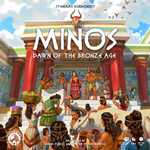
Minos: Dawn Of The Bronze Age Board Game
In the ancient realm of Crete, amidst the sun-drenched shores and labyrinthine corridors of Knossos, the fate of the Minoan civilization is yet to be determined. As a member of one of the four illustrious Minoan clans, your destiny beckons you to vie for the prestigious title of Minos, the ultimate leader of your people.
But keep in mind - unlike the tumultuous conquests of other civilizations, the Minoans are renowned for their pursuit of peace and prosperity. In this captivating journey, the essence of your quest lies not in the clash of swords, but in the art of governance and the cultivation of your clan's unique identity.
As leaders of Minoan clans players are in charge of the first European civilization. Build cities, monuments and other structures, open new trade routes, expand and fight off outsiders out of your land, plan your actions with your clan council, research and issue decrees so your actions will be more powerful than your opponents! You have only 4 rounds to prove you are worthy of the legendary Minos title.
Draft and assign the dice to the programming board. With lower value dice you can secure stronger actions but the higher value dice will help you climb on the tracks and gain their benefits. During the action phase each player takes their dice in order from highest to lowest and performing the pre-planned actions. Players also build their tableau - each card has an instant effect and a triggered reward connected to the specific action or die value they can use to make the action more powerful. Moreover, twice in the game players get Victory Points for their civilization progress in the region.
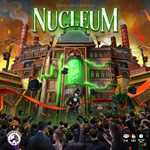
Nucleum Board Game
When Elsa von Fr¹hlingfeld presented her invention to King Frederik Augustus II of Saxony, people thought it was trickery. She used the recently isolated element Uranium to heat up a jar of water and used the resulting steam to power an engine that kept the Uranium active via a process she called 'atomization.' Her device, the Nucleum, ushered in a new era of energy and prosperity over the next decades. Saxony went from a minor regional power to the hub of European science and engineering. Now, a generation later, factories are still hungry for more power, demanding bigger and more Nucleums to be built, more Uranium imported from the nearby country of Bohemia, and railways and power lines built across the country to carry the tamed power of the atoms to Saxony's great cities. Inventors, engineers, and industrialists flock to the Saxon court, vying to be the leader in this new industrial revolution.
Nucleum is a heavy euro board game in which players take role of industrialists trying to succeed during the economic and technological boom of 19th-century Saxony, fueled by the invention and spread of the Nucleum (a nuclear reactor).
Players earn victory points by developing their networks, building and powering urban buildings, securing contracts, and meeting milestones (randomized endgame goals). Each player also gets unique asymmetric technologies, giving them special powers when unlocked. Gameplay is continuous; players take turns one after another with no rounds or phases.

Nucleum Board Game: Australia Expansion
Saxony's energy revolution was so impactful that everyone wanted to start using Nucleums in their regions. Australia's huge deposits of uranium were ripe for the taking, leading to visionaries - lured by the vast number of possibilities - visiting the continent and changing it into a new global power. Here, these entrepreneurs have to face new challenges presented by the sheer size of the continent.
Fortunately, the clever use of shipping lanes will help them transport resources more efficiently than by rail and even gain access to the nearby island of Tasmania, where a mad scientist conducting his own experiments managed to replicate Elsa's invention, which is now proudly presented as an experimental power plant in the island's capital of Hobart. Nucleum: Australia comes with a new map that introduces several new concepts and rule changes to the Nucleum base game. Use shipping lanes to expand your networks, build your own coal mines, and try the expert variant with bidding for the experiments.
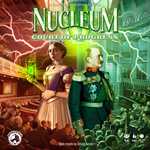
Nucleum Board Game: Court Of Progress Expansion
As the 19th century draws to a close, the monarchies of Europe struggle to stay relevant in this rapidly changing age. Whether it's the court of King Frederik in Saxony or the court of the aging Queen Victoria of the British Empire trying to maintain rule over the faraway riches of Australia, they must all contend with the rising political forces clamoring to secure their piece of the pie in the nuclear revolution. As ideologies clash in parliaments, entrepreneurs like yourself must do their best to make sure they have plenty of friends in the halls of power.
Nucleum: Court of Progress introduces several new concepts and rule changes that can be added to the base game and/or Nucleum: Australia. Via the new Court action players get a chance to send their workers to political parties and even become their leaders to gain various benefits. Joining a Party provides instant rewards and opportunities to earn VP during King's Day Scoring, which is now much more significant. The expansion also adds two new Experiments, new action tiles, contracts, etc.
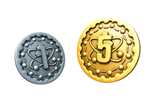
Nucleum Board Game: Metal Coins
If you are not feeling the weight of your decision with each spent coin, we have a solution for that. Our finely crafted metal coins greatly enhance the immersion in the industrial world of Nucleum. These deep-relief zinc-alloy coins are an amazing upgrade for an amazing game.
Includes:
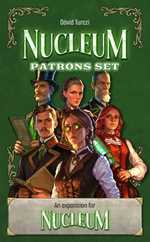
Nucleum Board Game: Patrons Set Booster
This mini expansion brings Patron Cards into the game.
Each Patron Card belongs to the specific Experiment board. In the base game those Experiments are distinguished by letters only. Now, on every Patron card you can see the occupation of each Patron associated with the specific Experiment along with their description and image depicting them.
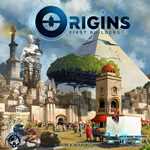
Origins Board Game: First Builders
Players are members of a powerful and ancient space-faring race that visits Earth regularly to bestow gifts of progress and wonders upon the blossoming humanity. You will influence the construction of buildings and monuments, guide a population of your freemen, climb the three mighty zodiac temples, and take part in an arms race - all in an effort to leave the greatest mark on mankind's ancient history.
You start the game with a city consisting of just two building tiles: the Agora tile and the Palace tile. As the game develops, your city will grow in both size and strength as you add new building tiles, each of which has a special ability that triggers when it's first added to a city and when closing a district. Your placement on the military track indicates the rewards you receive when you attack and your chances of becoming first player.
The game is played over a number of rounds, with a round ending only after each player has passed. If a game end condition has not yet been triggered, the game continues with a new round. On your turn, you perform one of the following actions:
The game finishes at the end of the round when one or more of the following conditions has been met:
The temple area is divided into three tracks: the sea temple, the forest temple, and the mountain temple. You score points only for your two least-valued temples, and once all the points have been summed, whoever has the most VPs wins.

Reef Project Board Game
Despite covering less than 1% of the ocean floor, coral reefs are estimated to be home to about 25% of all marine species. Unfortunately, these vibrant underwater cities are dying. Climate change and its effect of rising sea temperatures is devastating the colorful algae that give coral reefs their brilliant hues, resulting in coral bleaching. Furthermore, other threats like pollution - in its various insidious forms - and overfishing are disrupting the delicate balance of reef ecosystems.
And so, scientists from various fields, along with the researchers studying the ecological complexity and significance of the reefs, are collaborating to address the myriad challenges facing these ecosystems. Your assignment is to take command of a scientific vessel and embark on a journey of reef conservation. Hire the best crew, clean the ocean, and restore the reefs to their former glory.
During the game, players take on the role of researchers and saviors of the oceans. You will sail the seas, hire crew, explore the coral reef, clean the ocean sectors of any pollution, and try to accomplish as many missions as possible.
On their turn players may choose to RECHARGE or TRAVEL. If they RECHARGE, they gain the rewards from the VP track. If they TRAVEL, they may deploy Reef Balls, move their Ship, play Mission cards, and perform various actions. The game is played for a variable number of rounds. When a player has crossed the 45 VP threshold, the end of the game is triggered. After an additional round the final scoring takes place and the player with the most victory points is the winner.
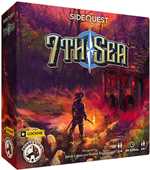
SideQuest Board Game: 7th Sea
Hurry! From what you've heard in the inn the Dragonsteel Shield can be found in N¹llrode, but the Inquisition is already on their way! You're lucky they chose to use the roads ? you can overtake them using the shortcut. A few hours, two terrified settlements, and one totally honorable saber duel later, you are here. The village looks boring, but there is an old, pagan chapel, seemingly sealed tightly. Sneaking in is not an option, so it's time to get these doors open!
Get inside the chapel and reach for treasure before others! SideQuest: 7th Sea is an escape room-style game set in the world of well-known TTRPG system 7th Sea, published by Chaosium.
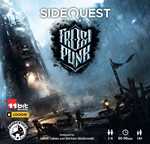
SideQuest Board Game: Frostpunk
You signed up for this mission knowing that many have failed before. You're leading, what, the umpteenth group of scouts in search of a place to call home? Each day is the same out here - white snow and unbearable cold - but it's the grim and desperate faces of your team that keep you from sleeping. After who knows how long trekking through snow, you finally spot something in the distance, an abandoned generator. You're almost out of provisions, almost out of time. You have six days to make this ruin inhabitable before you have to turn back and report on what you've accomplished. Will this be yet another false light on the horizon, or a new beginning for your people?
Side Quest: Frostpunk provides players with engaging puzzles, an interesting storyline, and difficult decisions. The game tests your creativity, perceptiveness, and ability to think outside the box. It's time to join the expedition to ensure that we have enough resources to survive and keep the generator working! Side Quest: Frostpunk is a new, exciting puzzle game from the authors of the Escape Tales series, set in the immersive world of Frostpunk - the globally acclaimed video game from 11 Bit Studios.
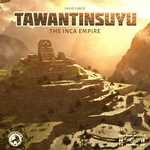
Tawantinsuyu Board Game: The Inca Empire
The great Sapa Inca Pachacuti turned to his offspring and ordered them to worship Inti, the Sun God, and to expand the Inca Empire as far as the llamas roam. With Chinchaysuyu, Antisuyu, Qullasuyu, and Kuntisuyu - the four regions of the new empire - now ripe for conquest, the time has come for Pachacuti's true successor to arise.Gather your people from the villages below and use their unique abilities to strategically place them where they can perform the greatest tasks for you. Climb the steps of the Sun Temple, reaping the rewards of your piety. Build structures that both nourish your people and provide you with benefits no other has at their disposal. Muster an army and conquer villages in the four realms of Tawantinsuyu. Prove yourself a worthy successor to Pachacuti and lead the Inca to glory!
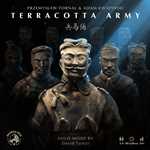
Terracotta Army Board Game
Emperor Qin Shi Huang has passed away. To protect him in the afterlife, a great army in the form of statues of faithful warriors must be assembled to stand guard in the Emperor's tomb. You will be among those tasked with building this magnificent army.
In Terracotta Army, you represent talented craftsmen and artists laboring to build the wondrous assembly of statues. During the game, you collect resources, upgrade your workers, and seek favor with the Emperor's advisors. Your goal is to play a crucial role in the process of creating the terracotta army, and your success is measured in victory points (VPs). During the game, you and your fellow players build the army together, but after the fifth round of the game is over, only one of you - the one with the most points - will stand as the winner.
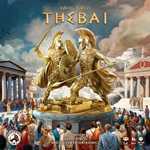
Thebai Board Game (Pre-Order)
In Thebai, players assume the role of influential leaders from noble families during the tumultuous late Bronze Age. Throughout the game, players are tasked with rebuilding the Cadmea, the citadel of Thebes, while restoring the city's exports, praying to the gods of the city, and protecting the lives of the citizens as grand heroes spill each other's blood outside the gates.
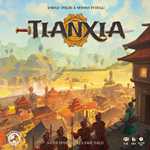
Tianxia Board Game
The Warring States period was a pivotal era in Chinese history, marked by constant warfare, significant bureaucratic and military reforms, and the consolidation of power among rival states.
The game is set around 260 BCE, a time when the seven warring kingdoms ? Yan, Zhao, Han, Wei, Qi, Chu, and Qin - were locked in fierce conflict, both against each other as well as against nomadic groups like the Xiongnu, who posed a threat from the north.
Although sections of the Great Wall of China had been constructed as early as the 8th century BCE, the later years of the Warring States period saw a surge in defensive building projects.
Before the Qin ultimately unified the kingdoms, extensive fortifications, watchtowers, and new sections of the wall were erected to bolster defenses.
In Tianxia Board Game, players take the role of leaders of noble families who want to earn prestige, as well as favors from the powerful rulers that govern the seven Warring Kingdoms.
The game lasts four rounds, in which you install Governors in the regions, bolster the power of rival ruling houses and thus their favor. You also sell goods to merchant ships that sail the Chinese shores to gain wealth and various other benefits.
Nevertheless, you must not forget about the nomadic warriors who pose a constant threat on the northern borders of the seven kingdoms. Thus, you must train soldiers and build walls and towers to weaken the invaders and protect your interests, earning prestige in the process.
Each round the Nomads (Xiongnu) advance toward the borders of the seven kingdoms and gather even larger numbers. When they reach the border, a battle takes place that affects all players.
At the end of the game, the player who was the best governor, politician, merchant, and protector becomes the winner!
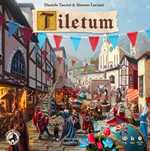
Tiletum Board Game
In Tiletum, you and fellow players take on the roles of rich merchants traveling throughout Europe, from Flanders to Venice, during the Golden Age of the Renaissance.
You will travel to various cities to acquire trade contracts for wool and iron, as well as a collection of their coats of arms. You must collect the required resources to fulfill contracts, invest in the construction of monumental cathedrals, gain the favor of noble families, and participate in important fairs where your main business occurs. You will also use the services of notable people who will be welcomed into your houses. You will thus gain prestige that will make you the most famous merchant of the Renaissance.
Tiletum is a dice management game in which dice have a dual function: gaining resources and performing actions. A certain number of dice will be rolled each round. On your turn, choose a die to gain the number of corresponding resources equal to the value of the die, then perform the associated action. The power of the action is inversely proportional to the value of the die, so the fewer resources you gain, the more powerful the actions you take and vice versa.
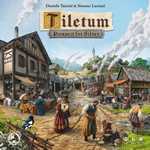
Tiletum Board Game: Prospect For Silver Expansion
Welcome to the Renaissance, where merchants' thirst for gold is rivaled only by their desire for silver. As you amass your initial wealth, your first move is to dispatch prospectors to delve into the depths of silver mines, extracting this coveted resource. With silver in hand, you can now invest in the expertise of scholars and artisans, gaining crucial advantages over your rivals. Moreover, you'll embark on a mission to improve the harsh conditions of mining by constructing Underground houses and Cathedrals within the mines themselves.
But your ambitions know no bounds. As you expand your operations, you'll venture into new territories, previously beyond your reach, sending your prospectors to uncover even more lucrative mines. Are you ready to navigate the treacherous waters of Renaissance commerce and claim your place among the elite merchants of the era? Tiletum: Prospect for Silver introduces a unique resource, Silver. To gain it, you need to utilize a new type of action that controls your Prospectors, moving them on Underground maps in search of sources of this precious material. Moreover, Silver allows you to acquire Technologies that vastly enhance your game.
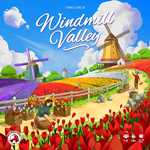
Windmill Valley Board Game
It's the late 19th century, and more than 9000 windmills dot the landscape of the Netherlands, some of them purpose-built to dry the lowlands, called polders. In the polders between these windmills are fields filled with colorful tulips-the flower that once was a part of the turbulent history of the first financial bubble but is now simply a quintessential part of the Dutch landscape, especially on the famous Bloemen Route (or "Flower Route").
In Windmill Valley, a game inspired by the Bloemen Route, you and up to three players take on the role of tulip farmers and entrepreneurs. You will build and enhance your windmills, look for new tulip bulbs in foreign trades or among local vendors to buy and plant, and try to get an edge with hired help and lucrative contracts. Let your blooming fields make your competitors green with envy!
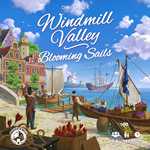
Windmill Valley Board Game: Blooming Sails Expansion (Pre-Order)
Set sail and grow your tulip empire with Windmill Valley: Blooming Sails, a rich expansion for the acclaimed euro game Windmill Valley.
This expansion introduces exciting new strategic layers to your gameplay, centered around maritime trade and market expansion.
As demand for tulips blossoms, players take bold steps to buy ships and navigate between ports, exchanging prized tulip bulbs for valuable rewards.
The new Ship movement mechanic reshapes the Foreign Trade action and adds fresh tactical depth. Additionally, the updated Calendar system offers players the choice between the regular and expert variants, increasing replayability and challenge.
Whether you're advancing on the Calendar or plotting your next port stop, Blooming Sails invites you to master the art of network building and market timing to become the leading tulip trader in the Netherlands.
Raise your sails and set your course - your tulip business is ready to bloom on the open seas!
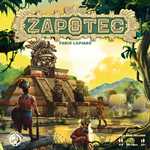
Zapotec Board Game
In a game of Zapotec, you build temples, cornfields and villages in the three valleys surrounding the capital to generate resources needed for building pyramids, making sacrifices to the gods, and performing rituals.
Each round, players simultaneously pick a card from their hand to determine their turn order and the resources they collect. Players then perform individual turns and spend resources to build new houses, gain access to special abilities, make sacrifices to the gods and build pyramids.
At the end of the round, players draft new cards from the central offer, with the final undrafted card becoming the scoring bonus card for the following round.
After five rounds, players score points for pyramids, for their position on the sacrifice track, and for their ritual cards. The player with the most victory points wins.






